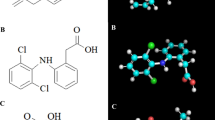Abstract.
Severe gastro-intestinal complications are a major cause of NSAID-induced deaths in cases of rheumatoid arthritis. We measured COX selectivity by using an intact cell assay system, and found that NS-398 is a highly COX-2–selective inhibitor. Meloxicam, etodolac and diclofenac also showed high COX-2 selectivity. Zaltoprofen, loxoprofen-SRS (active metabolite of loxoprofen), 6-MNA (active metabolite of nabumetone) and ibuprofen showed intermediate COX-2 selectivity. The lowest COX-2 selectivities, which means the highest COX-1 selectivities, were observed in indomethacin, aspirin, and oxaprozin. There appears to be a good relationship between our data and some clinical data of severe gastro-intestinal toxicity. The more a given NSAID is selective for COX-2, the safer it is for clinical use. In conclusion, to anticipate the safety of NSAIDs, we find that an intact cell assay system, using human cells for measurement of COX selectivity, may be more useful than using direct enzyme assay systems.
Similar content being viewed by others
Author information
Authors and Affiliations
Rights and permissions
About this article
Cite this article
Kawai, S. Cyclooxygenase selectivity and the risk of gastro-intestinal complications of various non-steroidal anti-inflammatory drugs: A clinical consideration. Inflamm. res. 47 (Suppl 2), 102–106 (1998). https://doi.org/10.1007/s000110050291
Issue Date:
DOI: https://doi.org/10.1007/s000110050291



